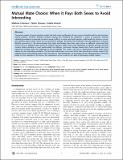Mutual mate choice : when it pays both sexes to avoid inbreeding
Abstract
Theoretical models of sexual selection predict that both males and females of many species should benefit by selecting their mating partners. However, empirical evidence testing and validating this prediction is scarce. In particular, whereas inbreeding avoidance is expected to induce sexual conflicts, in some cases both partners could benefit by acting in concert and exerting mutual mate choice for non-assortative pairings. We tested this prediction with the gregarious cockroach Blattella germanica (L.). We demonstrated that males and females base their mate choice on different criteria and that choice occurs at different steps during the mating sequence. Males assess their relatedness to females through antennal contacts before deciding to court preferentially non-siblings. Conversely, females biased their choice towards the most vigorously courting males that happened to be non-siblings. This study is the first to demonstrate mutual mate choice leading to close inbreeding avoidance. The fact that outbred pairs were more fertile than inbred pairs strongly supports the adaptive value of this mating system, which includes no "best phenotype'' as the quality of two mating partners is primarily linked to their relatedness. We discuss the implications of our results in the light of inbreeding conflict models.
Citation
Lihoreau , M , Zimmer , C & Rivault , C 2008 , ' Mutual mate choice : when it pays both sexes to avoid inbreeding ' , PLoS ONE , vol. 3 , no. 10 , e3365 . https://doi.org/10.1371/journal.pone.0003365
Publication
PLoS ONE
Status
Peer reviewed
ISSN
1932-6203Type
Journal article
Collections
Items in the St Andrews Research Repository are protected by copyright, with all rights reserved, unless otherwise indicated.

